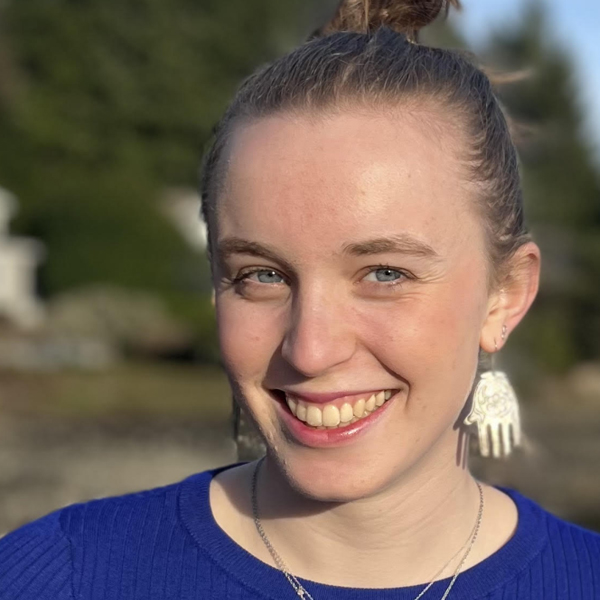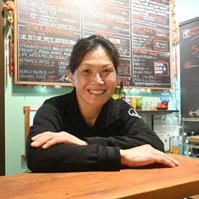Farming Out FRESH
Celebrating Old (and Finding New) Ways to Deliver Local Food
BY AUDREY NELSON
PHOTOS BY ANNIE GRAEBNER
CSA, or Community Supported Agriculture, has long been a popular way for consumers to acquire fresh meat and produce straight from the source—all while supporting local growers.
The CSA model works like this: Consumers purchase “shares” from farmers looking to sell produce, meat, seafood and other goods. These shares function as memberships, allowing consumers to receive weekly boxes of the farm’s fresh items during the harvest season.
CSAs have plenty of upsides. They encourage face-to-face interaction between farmers and consumers. They also offer producers a way to spread out the risks inherent in farming.
But on the consumer end, there can be friction points. Thanks to upfront membership payments, CSA boxes come like clockwork. “If you’re going on vacation—here on Bainbridge, which happens a lot during the summer—you miss those weeks,” said Brian MacWhorter, the longtime owner of Bainbridge’s Butler Green Farms. “Unless you have a neighbor pick them up for you, you just lose out.”
Another negative?
As a little girl, tearing through book after book, she would have been delighted by this one: Once upon a time, a little girl who loved stories grew up to become an author.
Today, Lacko has two novels under her belt, as well as two social-emotional journals for kids and teens. Her most recent book, “The Secret Song of Shelby Rey,” was published in June, as a collaboration between SparkPress and Simon & Schuster.
“Shelby Rey” tells the story of 18-year-old Shelby, a traumatized teen drawn into the orbit of a rock ‘n’ roll band in 2008 Los Angeles. Whenever Shelby touches someone else, she can hear music—that person’s innermost self, uniquely expressed.
Just as with books, Lacko has always been drawn to music. “Everything has been sung about,” she marveled. “Everything has been expressed.” She recalled a moment in high school when a song blared through the cafeteria, raising the hair on her arms. Years later, that memory became the spark for “Shelby Rey.”
By 2009, Lacko was living in Orange County, tapping out “one paragraph at a time” of “Shelby Rey” while juggling a toddler and a kindergartener. An early draft of the novel found its way to local music therapists working with nonverbal teenage patients. Those therapists asked Lacko to design workbooks to accompany it.
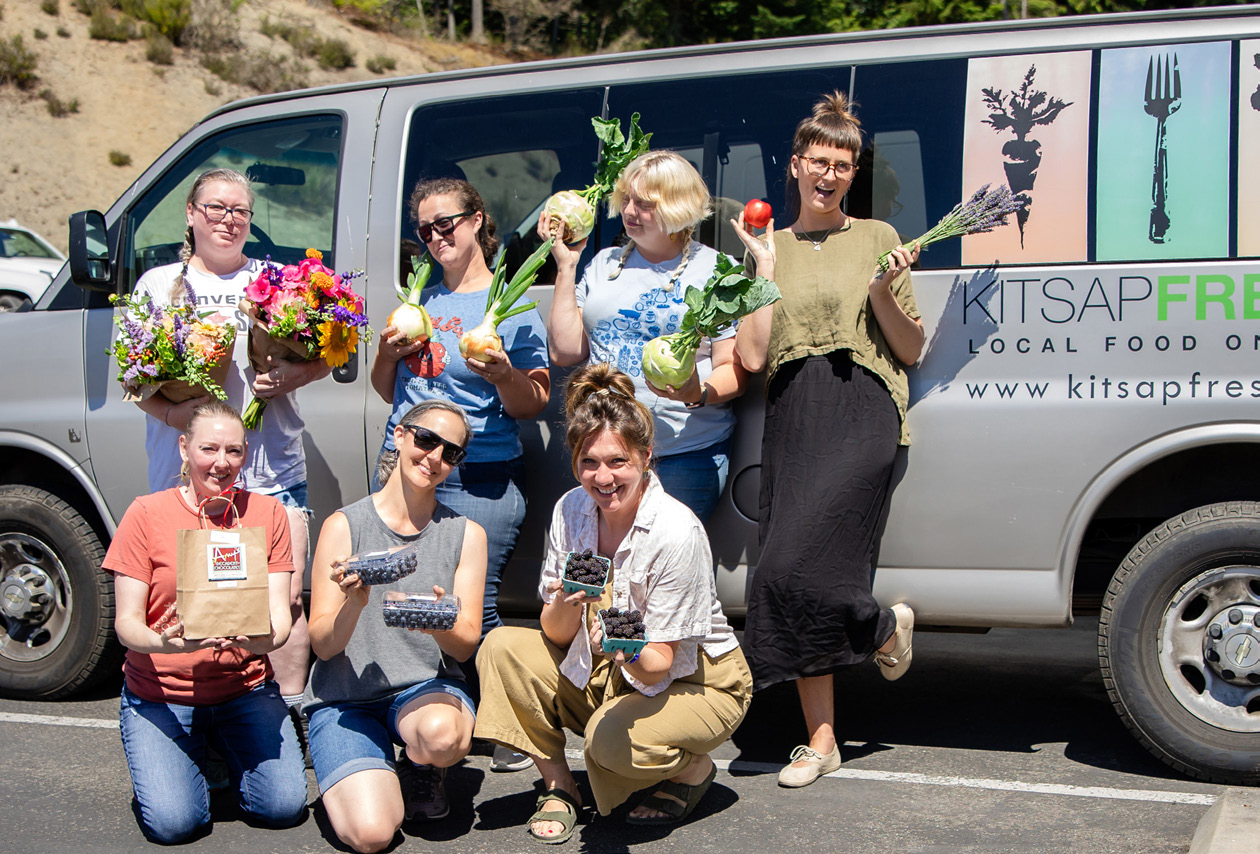
“Maybe you don’t get to choose what goes in [the box],” Renee Ziemann of Full Tilth Farms, said diplomatically.
MacWhorter was more direct: “Early on—in the early spring—you get a lot of turnips.”
Ziemann and MacWhorter are two of the Kitsap farmers who have decided to diversify their direct-to-consumer offerings beyond a single, traditional CSA program.
Keeping Things Fresh
Ziemann still runs a small CSA for Full Tilth Farms, which is based in Poulsbo. But she’s also co-president of Kitsap Fresh, a nonprofit “online farmers market” with a flexible membership model.
Kitsap Fresh was founded in 2015 by a small group of farmers new to the area. Many of them had experience with the online farmers market model. “When they got to Poulsbo and saw that there wasn’t this alternative market, then they put a lot of their own time and energy into creating it,” Ziemann said. (Kitsap Fresh’s website proudly states that each farmer wrote a $35 check to get their new organization off the ground.)
Under the Kitsap Fresh model, local growers apply for membership on the site. Each week, approved growers post listings—with photos!—for any goods they have to sell. Over the weekend, consumers browse the postings and select what they want. Growers then ship their bounty to Kitsap Fresh’s warehouse, where orders are sorted for pickup and delivery on Wednesday and Thursday.
Since its debut, Kitsap Fresh has ballooned into a county powerhouse. It now has eight distribution centers, including one at Bainbridge’s Johnson Farm. There is also a home delivery option. Last year, Kitsap Fresh paid more than $400,000 to local growers, according to its website.
Mary McKeirnan is Kitsap Fresh’s warehouse and operations manager. She grew up in an area without readily available fresh produce, and for her, Kitsap Fresh’s success reflects the Northwest’s passion for local food.
“If you’ve ever lived somewhere where they don’t have farmers markets and things like that, it’s amazing to have [Kitsap’s] community and celebration around food,” McKeirnan said. “We’re really lucky that Kitsap supports that.”
Many Kitsap residents turned to Kitsap Fresh during the COVID pandemic, spurred by shuttered farmers markets and disrupted supply chains. At the time, Kitsap Fresh was still a relatively small organization. Its growth throughout the pandemic “showed how necessary it is to have different models where people can access local food,” Ziemann said. “Kitsap Fresh filled a niche that didn’t exist for people.”
Even post-pandemic, Kitsap Fresh has continued to prove itself uniquely suited to the county’s needs.
Kitsap has “a lot of smaller farms,” Ziemann said. “We’re just zoned differently [than many neighboring counties]. And if you’re a certain size farm, a farmers market and CSA are unattainable for you.”
For these smaller farms, Kitsap Fresh provides legitimacy along with profit. “When you post your food on Kitsap Fresh, you don’t look like a small table, like you do at the farmers market,” Ziemann explained. “You look like a farm, next to the other farms.”
‘Without Farms, There’s No Food’
Ziemann’s farming mentor, Brian MacWhorter, first established his Butler Green CSA program more than 30 years ago. But he caught the bug for farming long before that, “hanging out in the garden a lot, eating fresh stuff” as a kid. By the time he moved to Bainbridge—after an early career that included military service and establishing a farmers market in Eugene, Oregon—he was ready to create something tangible and community-oriented. He wanted to get good, local food into islanders’ hands.
MacWhorter helped found the Bainbridge Island Farmers’ Market and currently serves as its president. His farm has a weekly presence there. But his pet project—and a significant source of income for Butler Green—is his modified CSA.
Instead of providing pre-packaged boxes for pickup, MacWhorter sells produce out of a small Lovgreen Road farmstand, the walls of which are lined with bins of fresh tomatoes and greens. MacWhorter also sometimes sells products grown by other farms, such as raspberries and marionberries. While customers do pay an upfront fee for a share, MacWhorter’s account model is more flexible than a traditional CSA, allowing people to skip pickup weeks, choose what produce they want and add money to their account at any time.
CSA members—as well as those interested in becoming members—can swing by the Lovgreen stand from noon to 5 p.m. every Tuesday and Thursday to investigate MacWhorter’s array of products.
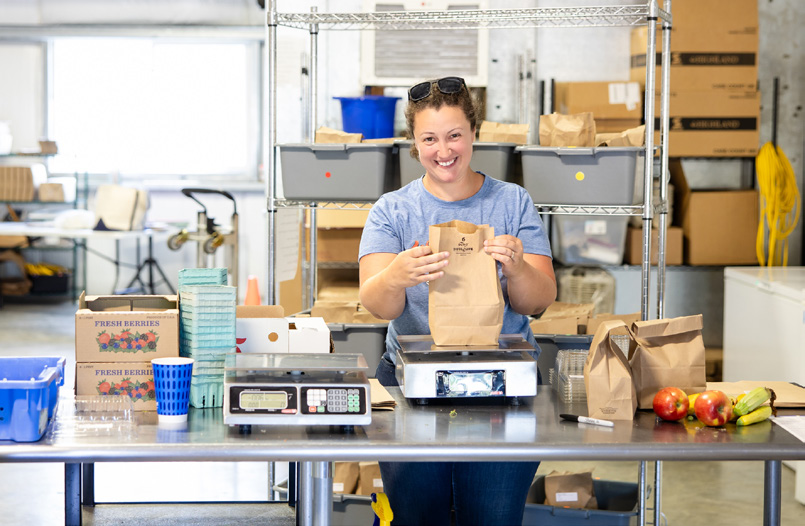
And it’s an impressive array. MacWhorter has a superpower: He’s an expert in season extension, or growing crops outside of their natural growing and harvesting seasons. Customers often marvel: “You mean you have tomatoes in May?” Yes, MacWhorter said. “I can offer a bigger selection of stuff [than a traditional CSA],” he boasted. “People are excited about that.”
MacWhorter has operated his CSA stand for 35 years. Some customers, he said, have been coming to the stand all 35 of those years. Although these days MacWhorter is taking a less hands-on role at the stand, he still keeps his customers engaged with regular email newsletters. The communication feeds MacWhorter’s need for community; it also allows him to educate local people on what it is, exactly, that farmers do. To him, there’s nothing more important than this advocacy.
“Without farms, there’s no food,” he said. “And if you don’t have farmers, you don’t have farms.”
Although proceeds from MacWhorter’s CSA stand don’t directly benefit his farming education nonprofit, Butler Green Farm School, he sees the stand as interconnected with his farming education work. Butler Green interns often work on projects for the stand (this year, it’s homemade kombucha and kimchi). And MacWhorter hopes that eventually, the farm school will buy out his farm and become his main legacy.
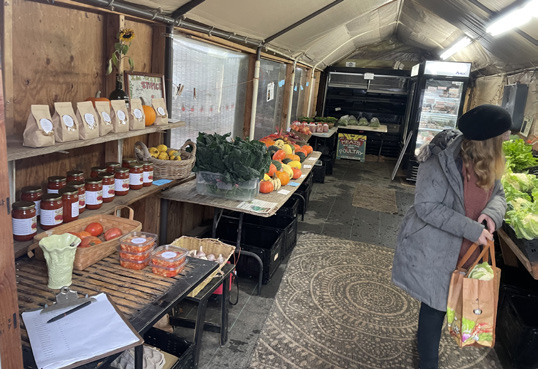
“When you think about what you’ve done in your lifetime, what mark you leave, how many people you helped—that’s what it’s about,” he said.
Still, it’s clear that despite his fascination with season extension, MacWhorter has no interest in extending his own season.
“They ask, ‘What happens when you die?’” he said, adding matter-of-factly, “The people that love you miss you. That’s the whole deal.”

